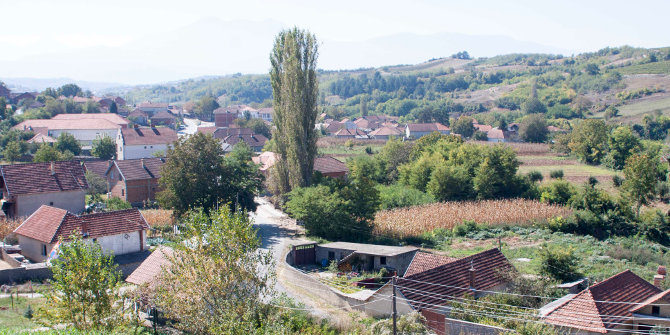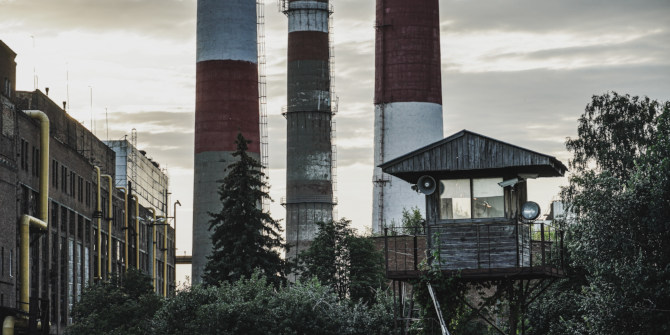Bulgarians will vote in a parliamentary election on 26 March. Dimitar Bechev argues that this time, the tide may be turning against Sofia’s most established politico and former PM Boyko Borisov, as polls suggest a neck and neck race between his centre-right party GERB and the Socialists. However, the next government will likely encompass a broad coalition and the real winner of the election is set to be the nationalist United Patriots’ alliance, which is forecast to gain a sizeable share of the vote. The deck of cards will therefore be reshuffled, but no dramatic turnarounds are in sight.
Going to the polls is turning out to be something of a national pastime in Bulgaria. Starting May 2013, citizens have cast their vote five times in general, European, local and presidential elections as well as in two referendums. On 26 March, they will be heading to the ballot boxes once more – to make their choice for a new parliament. This will be the third early election in this short span, after the ones in May 2013 and October 2014. It may not be the last.
At a certain level, the frequent polls may suggest democratic habits are alive and kicking in Bulgaria. After all, the forthcoming vote was triggered by the outcome of the presidential elections in November. Having lost the race against the main opposition candidate, ex-airforce chief Rumen Radev, the centre-right government headed by Boyko Borisov made good on its promise to tender its resignation. Some may even remember how Borisov stepped down in March 2013 after several weeks of street protests, cutting short the life of his previous cabinet.
In both cases, the former bodyguard, whose steady rise to the top was one of the main storylines of Bulgarian politics in the 2000s, paid tribute to the popular will. And last time around, his instinct proved right. After a brief spell in opposition, his party, Citizens for European Development of Bulgaria (GERB, literally “coat of arms”) was returned to power. So speeding up the electoral cycle worked well for Borisov, irrespective of whether it strengthened Bulgarian democracy or not.
This time around, the tide may be turning against Sofia’s most accomplished politico. Surveys suggest that Borisov is running neck and neck with the Bulgarian Socialist Party (BSP) led by Kornelia Ninova. Buoyed by Radev’s win in the presidential race, the Socialists are hopeful that their time has finally come after losing pretty much each and every contest over the past decade.
Ninova is working hard to rally the hardcore BSP electorate and win over some of GERB’s voters, as happened back in November. She is promising to increase pensions and public sector salaries, protect Bulgarian manufacturers and farmers by imposing quotas on big retail chains, do away with the EU sanctions against Russia and kill the free-trade agreement with Canada (CETA), and restart the nuclear power station at Belene (a project implemented by the Russian state firm, Rosatom). While Borisov is trumpeting the theme of stability (“never before was the situation in the Balkans as close to the brink of war”, he confided to a party gathering in Plovdiv), Ninova is pandering to the nostalgia for the pre-1989 decades shared widely amongst the BSP faithful. “Democracy took away from us a lot”, she posted on Facebook on 19 March.
Though Ninova might find it difficult to deliver on any of those points once in power, for the time being it seems that the message works and the momentum favours her. At the end of February, Alpha Research, a respected pollster, put BSP support at 29.6% to 31.5% for GERB. It is already a massive leap compared to the outcome of the last parliamentary elections in October 2014 when the Socialists lost with 15.4% to 32.7% for Borisov.
Whoever comes on top in the tight race, they will be faced with a thankless task of forging together a broad coalition. The real winner on 26 March will be the United Patriots‘ alliance, which is sure to bag at least 10% of the vote. The Patriots’ main achievement is building a cartel in the nationalist part of the spectrum, formerly split between the party Ataka and the Patriotic Front. Riding high on widespread fears of a Middle East refugee wave sweeping into Bulgaria (a theme exploited by the BSP and GERB too), their presidential candidate, Krasimir Karakachanov, finished third last November with 14.97%, a very solid chunk of the vote.
Another likely kingmaker for the next government is the businessman Veselin Mareshki, a self-styled Bulgarian replica of Donald Trump, who is currently polling at 5.7%. Mareshki’s chain of discount pharmacies and, more recently, petrol stations, have made him a household name which is now paying off electorally (a full 11.1% backed his presidential bid). Both the United Patriots and Mareshki’s Volya (“Will”) could side with either Borisov or the Socialists but they will, no doubt, exact a high price in terms of ministerial seats, resources and favours for their support.
Nationalists might find themselves in the uncomfortable position of sharing a cabinet with the Movement of Rights and Freedoms (DPS), which channels the votes of Bulgarian Turks and Muslims. That, however, won’t be as much of an overwhelming obstacle as it might look. A splinter group from the DPS, DOST (Democrats for Responsibility, Freedom and Tolerance, but also “friend” in Turkish) is mounting a challenge with the support of the government in Ankara. DPS, whose behind-the-scenes leader Ahmed Dogan is no friend of Erdogan, will comfortably wear the mantle of Bulgarian civic patriotism in order to claim a piece of the action. It is a party with long-standing experience with coalition governments which is famous for its broad business clientele as well as sway over the security services and the judiciary.
The elections will therefore reshuffle the deck of cards but are unlikely to bring any dramatic changes. The bad news is that politicians pushing for genuine institutional reforms and the rule of law are likely to do poorly. Divided between two factions, the New Republic coalition and “Yes, Bulgaria”, an anti-corruption movement headed by ex-Minister of Justice Hristo Ivanov, their chances of clearing the 4% electoral threshold appear slim. If they fail to make it, that will be a major setback to the increasingly vocal minority of urban, middle-class and pro-EU voters who fuelled the 2013-14 protests triggered by the appointment of tycoon Delyan Peevski, the poster boy of state capture in Bulgaria, as the director of the State Agency for National Security.
Yet, it won’t be game over on 26 March and everyone may soon get their second (or third, fourth) chance. The coalition that takes shape in Sofia may well hold on, or rather limp on, for some time but its likelihood of survival over the long haul is moderate. And there are a fair number of domestic and international challenges which can easily upset the fragile stability. Even if the average Bulgarian is of the persuasion that elections do not change anything, he or she may be making their way to the ballot box again soon.
Please read our comments policy before commenting.
Note: This article gives the views of the author, and not the position of EUROPP – European Politics and Policy, nor of the London School of Economics.
_________________________________
About the author
 Dimitar Bechev – Atlantic Council / University of North Carolina – Chapel Hill
Dimitar Bechev – Atlantic Council / University of North Carolina – Chapel Hill
Dimitar Bechev is a Nonresident Senior Fellow at the Atlantic Council’s Eurasia Center and a research fellow at the Center for Slavic, Eurasian, and East European Studies, University of North Carolina—Chapel Hill. He was formerly a Visiting Fellow at LSEE Research on South Eastern Europe (LSE European Institute) and Director of the Sofia Office at the European Council on Foreign Relations (ECFR) where he covered Turkey and the Western Balkans.





